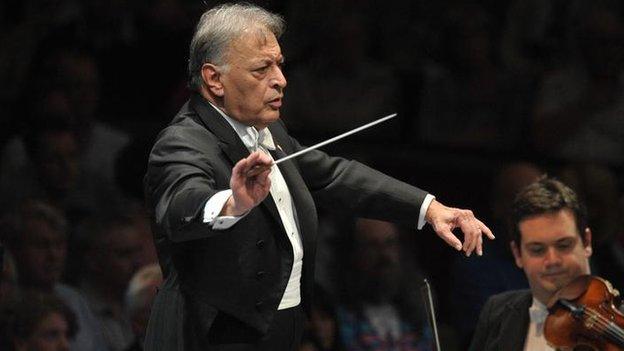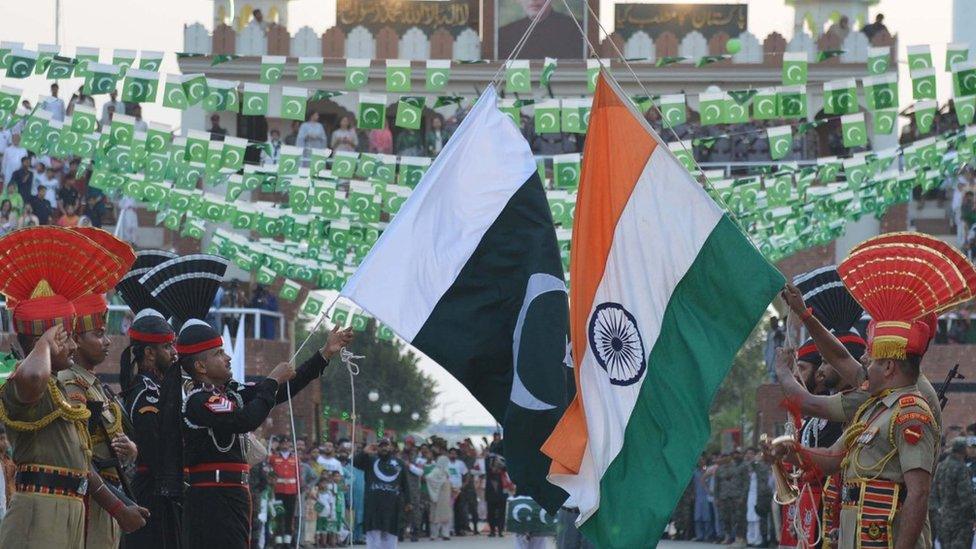Zubin Mehta in Kashmir: Concert hits controversial note
- Published
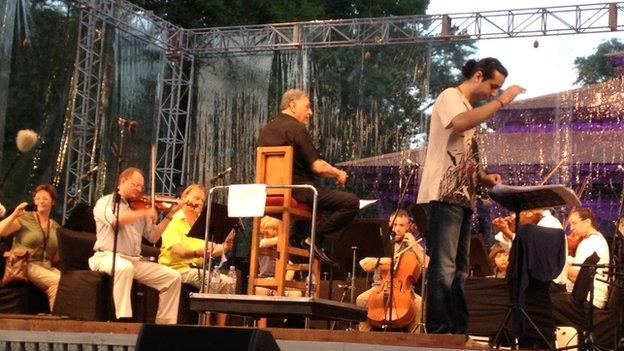
Conductor Zubin Mehta said the concert in Kashmir was a "dream come true"
Renowned conductor Zubin Mehta's planned concert in Indian-administered Kashmir has run into controversy with separatists and human rights activists opposing it. The BBC's Geeta Pandey reports from Srinagar.
The venue of Zubin Mehta's Saturday concert is the spectacular 17th Century Shalimar Gardens, which has the Himalayan mountains as its backdrop.
The garden has not looked so glorious in recent years - huge yellow marigolds, chrysanthemums, dahlias and other flowers line the pathways on which the guests will walk to hear the maestro perform Beethoven, Haydn and Tchaikovsky.
Mr Mehta has described the concert - named Ehsaas-e-Kashmir or Feelings for Kashmir - as "a dream come true".
An Indian-born Parsi, he will be accompanied by the Bavarian State Orchestra and 1,500 people have been invited, including government ministers and diplomats, and the performance is being broadcast live in more than 50 countries around the world.
The event is being hosted by the German ambassador to India, Michael Steiner, and is supported by the governments in Kashmir and Delhi.
'Wrong message'
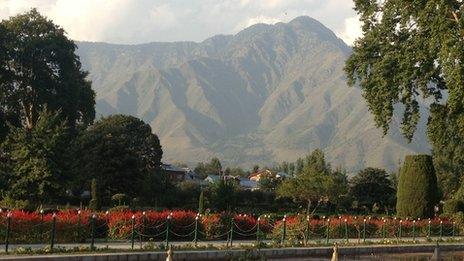
The 15th Century Shalimar Gardens has the Himalayan mountains as its backdrop
In announcing the concert last month, Mr Steiner said: "This concert is for the people of Kashmir. Beethoven, Haydn and Tchaikovsky, played by a world-acclaimed maestro and one of the best orchestras of the world in one of the most enchanting places in the world."
The aim of the concert was to "reach the hearts of the Kashmiris with a message of hope and encouragement", he added.
But Kashmiri separatists and activists say they do not want the event to take place in Kashmir.
"Here people are suffering and dying. We're oppressed by the Indian armed forces and the police. In such a situation, a music programme has no justification or relevance," veteran separatist leader, Syed Ali Shah Geelani, told the BBC.
Kashmir is disputed, with both India and Pakistan claiming the territory in its entirety. Thousands of Kashmiris have died after an armed uprising for freedom from India began in the late 1980s.
In the last few years, though, militancy has abated. And although there have been summer protests over local issues and a recent spike of attacks on security forces, tens of thousands of tourists have returned to the region and last year, the Kashmir Valley received more than a million tourists.
Mr Geelani believes that the concert is an attempt to "legitimise Indian rule in Kashmir".
"India, with help from Germany, wants to send out a message to the world that Kashmir is a part of India and that all is well here - that people are free, there is peace and prosperity, development works are on and that people are listening to music.
"But that is the wrong message," he said.
'Inconsiderate Germany'
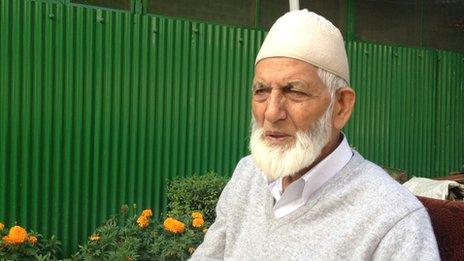
Mr Geelani believes the concert is an attempt to "legitimise Indian rule in Kashmir"
Mr Geelani has called a day-long strike on Saturday to protest against the event.
Some Kashmiri rights activists have announced a parallel concert - Haqeeqat-e-Kashmir or Reality of Kashmir - a few hours before Mr Mehta takes stage to counter his performance.
"Germany has been very inconsiderate," Khurram Parvez, of Jammu and Kashmir Coalition of Civil Societies, said.
"How can you collaborate with India, which is involved in human rights violations in Kashmir?" he asked.
Together with a number of activists, writers and academics, Mr Parvez, whose organisation works with the families of more than 8,000 people who have disappeared during the 23 years of conflict, wrote a letter to the German ambassador.
"Legitimising an occupation via a musical concert is completely unacceptable. Art as propaganda, as abundantly documented, was put to horrific use in Nazi Germany," the letter said, and requested the ambassador not to support the event.
Mr Parvez said the embassy "did not even acknowledge our letter".
The alternative concert expects to have local poets, singers and rap bands performing in a public garden. They also plan to have a photo exhibition, put up banners and posters and bring in victims of torture and families of the disappeared. The event is still awaiting official clearance.
'Inclusive event'
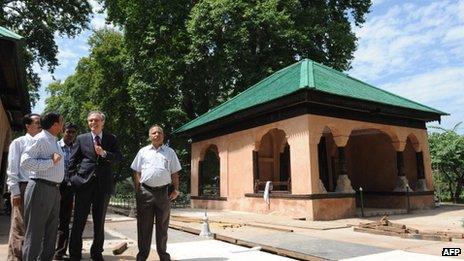
Mr Steiner, second from right, defended the event in an open letter to Kashmiris
The German embassy says that in the months leading up to the concert, the ambassador met and consulted a large number of people in Kashmir to make it an "inclusive event".
And in an open letter to Kashmiris, which was released to some Kashmiri newspapers, external, Mr Steiner defended the event.
"This concert has the potential to make the world look at the complex realities of Kahsmir: its breathtaking beauty as well as the many challenges you, the Kashmiris, face in daily life. I am well aware of the both," he wrote.
Speaking in the Indian capital, Delhi, a day before the concert, Mr Mehta said: "I hope to have the blessings of the people as music is the only language I know and hope to spread the message of peace with this performance,"
The concert, however, does have the support of some Kashmiris, who are describing it as "once-in-a-lifetime" event.
"I support it, it's a good thing for everyone, local people who are dependent on tourism will benefit," said hotelier Vivek Wazir.
"I agree with the protesters that bad things have happened here, but you need to move forward. You can't remain stuck in the past forever."
Mr Wazir says the Zubin Mehta concert may well be that one event that may set Kashmir off on the path of happier days.
"Music is supposed to be neutral, it provides a healing touch. Thousands of Kashmiris have died unnecessarily. Let this concert be looked upon as the event that applied the balm to people's wounds here."
- Published8 August 2012
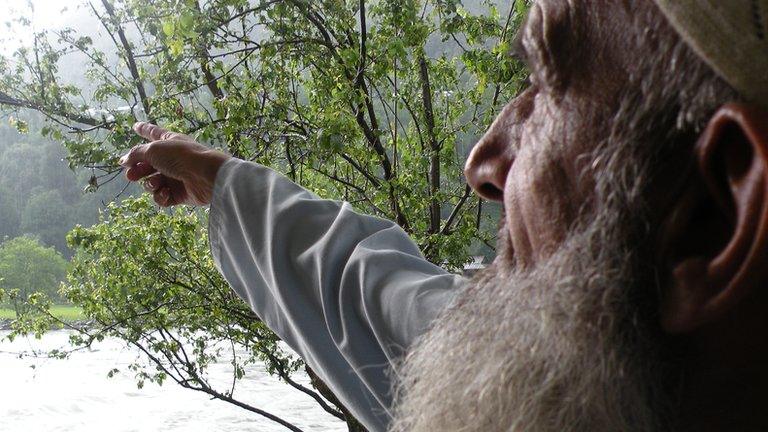
- Published3 September 2013
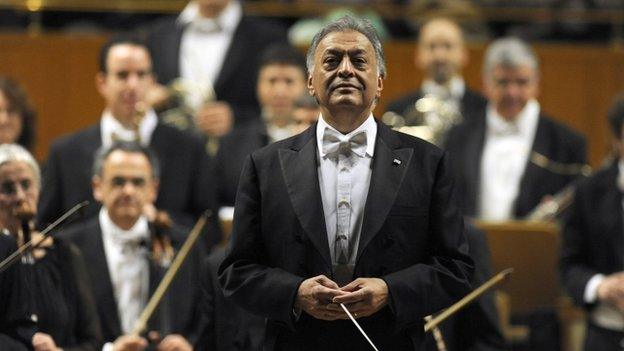
- Published27 August 2013
